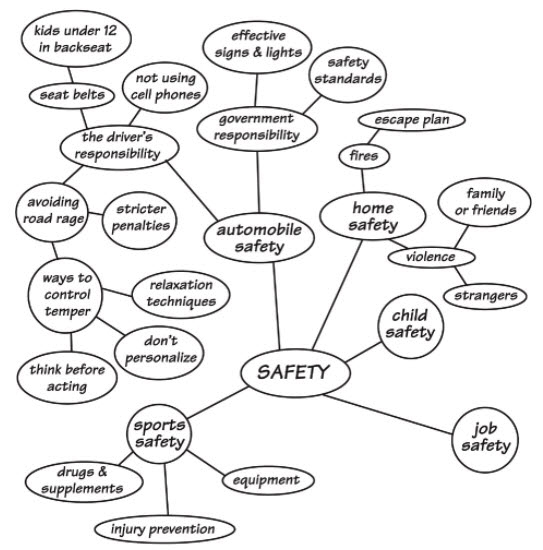Explore the Topic
At any point in the writing process, a writer may find that a topic needs further development or an idea needs to be better focused. During the drafting stage, for example, writers may need to generate an introductory paragraph or clarify an idea. During the revising stage, a writer may choose to provide more support for a particular point. In order to complete these tasks, a writer can turn to prewriting strategies.
During prewriting, a writer may explore a topic in a variety of ways:
- reading (in print and online),
- talking and listening, and
- jotting down ideas on paper.
To help bring their ideas into focus, writers can ask questions, consider different points of view, and use outlining to structure their thoughts.
Reading
Reading is a natural place to begin exploring a topic. Periodicals can provide current perspectives on a topic, and books offer lengthy, often in-
Talking and Listening
Talking and listening can also provide a wealth of ideas. Your friends, family, professors, and librarians can all lead you to new ways of thinking about a topic. Professors and librarians in particular can provide useful insights on your topic and point you to resources worth exploring.
Jotting Down Ideas on Paper
Freewriting
Your own views on a subject are important to explore as well. Prewriting strategies such as freewriting allow you to get your ideas down on paper quickly without stopping to edit or think too critically about what you want to say. This strategy allows your ideas to flow freely and thus leads to more material to work with. To take freewriting a step further, you can try looping. In looping, you stop freewriting after a set period of time and choose one idea from that freewriting to focus on. You then freewrite on that topic for a set period of time and repeat the process several times.
Cluster Mapping and Listing
Other ways to explore your own ideas include cluster mapping and listing. With cluster mapping, you map out a diagram that shows how an idea can build and how concepts are connected to each other. This technique is especially helpful for generating ideas. Here is an example of a cluster map for an assignment on ways to enhance safety. Notice that this writer developed some ideas more than others.

When cluster mapping, aim for at least four or five layers of related topics to develop substantial and interesting ideas.
Listing is a less visual method than clustering, but it is still a useful way to jot down ideas and keep track of key words and phrases, sometimes with subtopics. Outlining is a more organized method of listing that can help bring ideas into focus. In outlining, writers list topics, subtopics, sub-
Asking Questions
Other ways of focusing broad topics into more manageable ones include asking questions and cubing. One of the most basic questions writers can ask themselves is “So what?” In other words, “Why should anyone care about this topic?” Forcing yourself to answer the “so what?” question will help you develop your idea into a meaningful point.
Writers can also ask one or more common questions (Who? What? Where? When? Why? How? What is it like? What is it different from? Why does it matter?) to help stimulate ideas about a topic. For example, if your topic is “alternative breaks” (vacations for student volunteers) you might explore your topic like this:
Who goes on alternative breaks?
What are alternative breaks?
Why do people participate in alternative breaks?
How are alternative breaks different from traditional vacations?
Keeping your topic, audience, and purpose in mind as you explore your topic and focus your ideas will help you make the most of your prewriting. Here are some examples of questions you might ask in several different writing situations.
| If your assignment is... | Answer these questions... |
| To write an expressive or entertaining essay on student loans |
|
| To write an informative essay on student loans |
|
| To write a persuasive essay on student loans |
|
Cubing
Cubing has writers find new ways of thinking about a topic by examining it with six different techniques: describing, comparing, associating, analyzing, applying, and arguing for or against. Here is an example of cubing for the topic “electronic music festivals.”
Describe an electronic music festival, either from firsthand experience, reading about it, or interviewing others.
Compare an electronic music festival to another types of music festivals, such as a folk or jazz festival.
Associate an electronic music festival with other outdoor events, such as carnivals or parades.
Analyze the history and popularity of electronic music festivals.
Apply your knowledge of electronic music festivals to related ideas, such as rock concerts.
Argue for or against your campus (or town) hosting an electronic music festival.